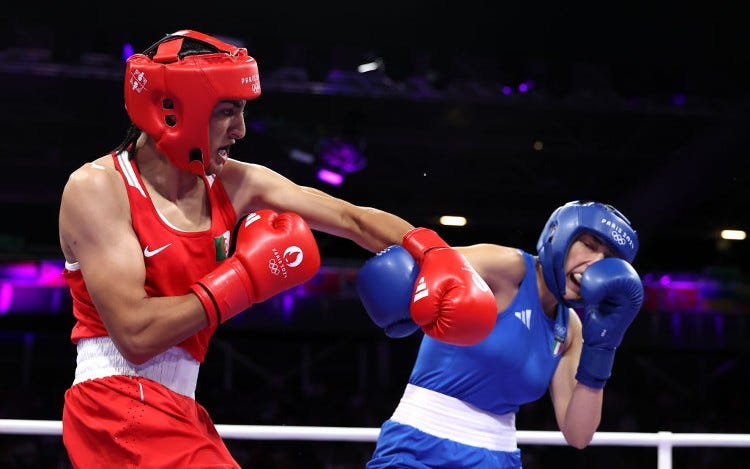The Gender in Sports Debate Gets Even More Confused (Which Didn't Seem Possible)
Transgender talking points come for not-transgender athletes

The main thing I’ve been rooting for this Olympics — besides the slow death of Colin Jost1 — is a controversy-free games. I’d like the athletes to be judged purely on the basis of their ability, physical attractiveness, and suitability for a tear-jerking NBC mini-bio, as God intended. Unfortunately, there’s a controversy in women’s boxing that highlights how our polarized discussion of trans athletes in women’s sports has rendered us deeply stupid.
There’s an Algerian boxer named Imane Khelif. Khelif competed in the Tokyo Olympics as a woman, though last year, she was banned from competing as a woman by the International Boxing Association. However, also in 2023, the International Olympic Committee withdrew its recognition of the IBA and assumed responsibility for overseeing women’s boxing. That cleared the way for Khelief to compete, because the IOC and IBA have different rules. Yesterday, Khelief fought her first Olympic bout — against Italy’s Angela Carini — and Carini withdrew after 46 seconds citing safety concerns. Here is the punch that caused Carini to say “I’ve never been hit that hard in my life,” and also Carini refusing to shake Khelif’s hand after the bout.
Unsurprisingly, this threw gasoline on our tire fire of a debate about trans women in sports. Which is one sign that our discussion is badly muddled, because Khelif is not transgender: She doesn’t claim to be trans, being trans would create huge problems for her in Algeria (where it’s illegal to even be gay), this simply isn’t about trans athletes. This is a about how to treat athletes with a difference in sex development (DSD), which has gotten subsumed by the debate around trans women in sports. And the proximity to the trans debate — which is the most “slather your head with honey and stick it in a colony of fire ants” issue that exists in politics right now — appears to have caused the IOC to be incapable of enforcing its own rules.




